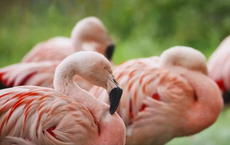Lake Naivasha, the ailing giant on its death bed
Kenya's water bodies facing extinction if nothing is done - fast

By Daniel Kaburu, for K24TV
Every day during the early morning, fishermen can be seen slowly pushing their boats onto the waters of Lake Naivasha - one of Kenya's renowned freshwater bodies that is critical for the ecosystems in the East African region.
While on the lake, images of the rising sun make the lake beautiful while a panoramic view of Mt Longonot in the distance adds to the breathtaking ambience.
Pelicans, water ducks and other bird species swim and hover around the 54-square-mile freshwater lake, as hippos dive in and out of the water. At the shores of the lake, buffaloes, gazelles and other animals graze gracefully.
But Lake Naivasha has been facing dire threats, most as a direct result of human activities which include encroachment by private landowners at the shores, pollution from surrounding flower farms, raw sewage from Naivasha town and the effects of the invasive weed hyacinth.
River Malewa from the Aberdare Ranges in the past has been feeding the lake with large amounts of water, but this could change as there are to construct a mega-dam upstream river.
This could reduce the volume of water entering the lake.
In addition, the situation could get worse for wildlife and other species that depend on the lake, should the Water Resource Authority (WRA) continue with its plan to review the lake’s boundary by 16 feet, a move that has been opposed by conservationists, surrounding communities and other stakeholders.
There are also claims that the plan to construct the dam is to reduce the volume of water entering the lake, thus create unoccupied land that is being eyed by some influential individuals for private use.
According to the National Environment Complaints Committee secretary John Chumo, wildlife and aquatic life that depend on the lake are already experiencing negative effects of this as land bordering the lake now dawn dykes erected by landowners that prevent hippos from accessing their farms, resulting in increased cases of human-wildlife conflict.
Fishermen at the Central Landing beach have raised concern over construction of the dam, saying the project will worsen their economic status.
However, Kenya's Water Cabinet Secretary, Simon Chelugui, said construction of a dam in River Malewa will not reduce the volume of water draining into the lake, but instead increase the water volume in the river because the dam will only harvest run-off water.
Chelugui also said there are no plans to review the riparian land boundary as it requires public participation and change in the law to do that.
The WRA has, however, not responded to reports of their plans to review the boundary.
Recently, Kenya hosted a Blue Economy conference that brought global stakeholders to the country's capital of Nairobi. At the end of the conference, pledges were made on how nations will fund the blue economy, but not much was said on the need to conserve lakes, rivers, oceans, wetlands and other water catchment areas that the blue economy depends on.
Significant money may be pumped into conferences such as the one recently held in Nairobi but if there are no applicable commitments and political goodwill from global leaders on conserving water bodies, little or no gains will be achieved from the forums.
The health of Kenya’s lakes are deteriorating at an alarming rate however, laxity seems to bedevil those tasked with spearheading their survival.
A few months ago, one of Kenya's local newspapers highlighted the state of Lake Kamnarok in Baringo county, Lake Turkana and Lake Magadi also in Kenya, but up till now, no significant measures have been taken to address concerns tabled.

This article is reproduced here as part of the Giants Club African Conservation Journalism Fellowships, a programme of the charity Space for Giants and supported by the owner of ESI Media, which includes independent.co.uk. It aims to expand the reach of conservation and environmental journalism in Africa, and bring more African voices into the international conservation debate. Read the original story here


Join our commenting forum
Join thought-provoking conversations, follow other Independent readers and see their replies